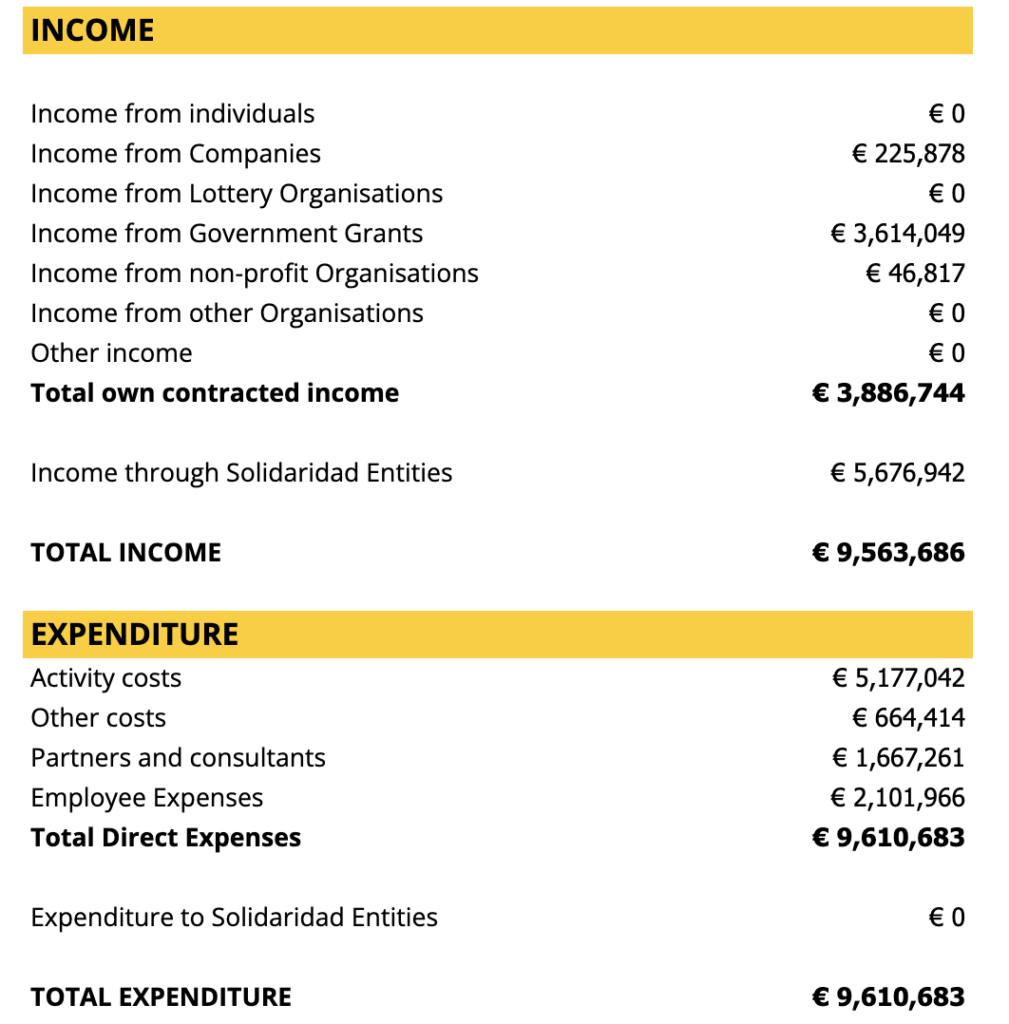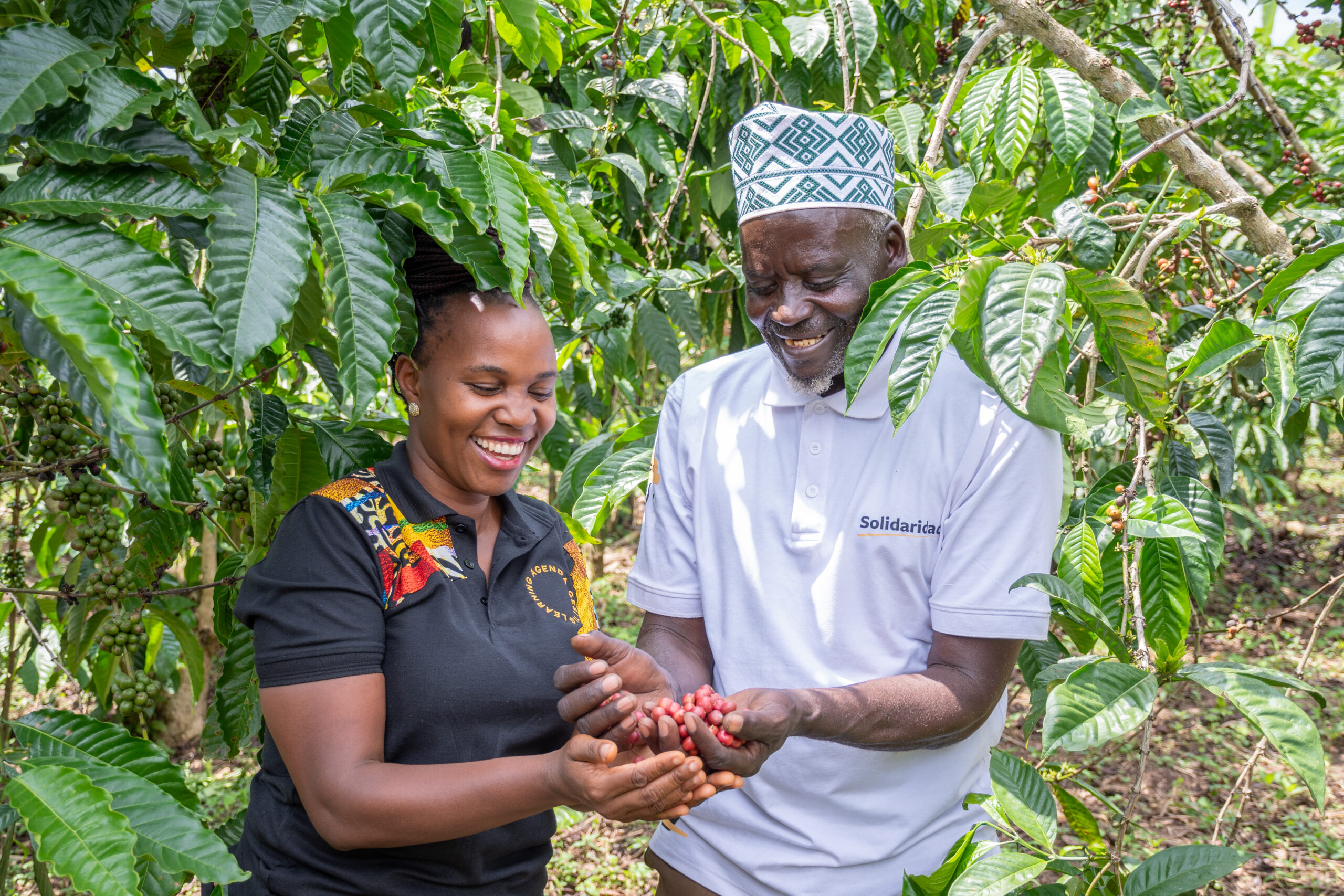Highlights
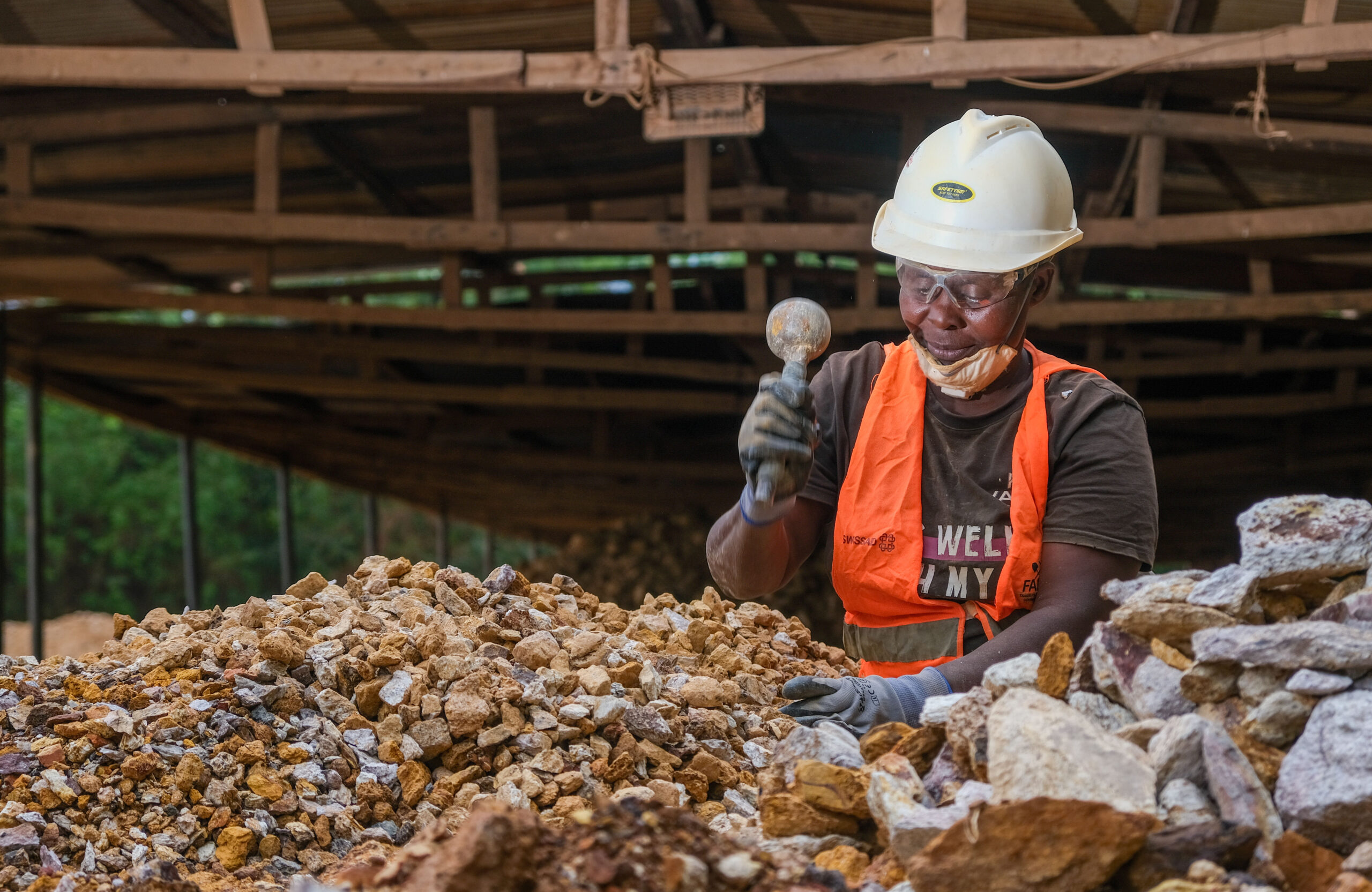
Solidaridad East Africa delivered training on geological concepts, among other topics, reaching 6,531 miners in Kenya, Tanzania, and Uganda. To address mercury pollution, we designed and distributed 130 improved retorts to 130 mines in Kenya and Tanzania and delivered training on personal protective equipment (PPE), achieving a 99% reduction in mercury vapor emissions during gold processing.
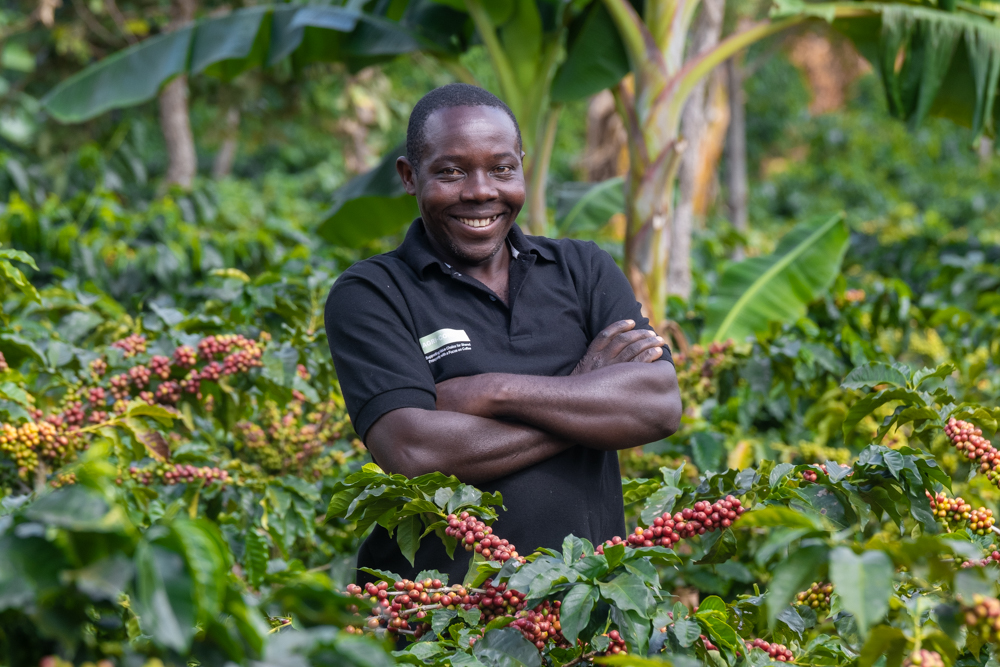
In Tanzania, we catalyzed transformative growth in 11 coffee cooperatives with Tshs 534 million (185,000 Euro) seed funding. Nine cooperatives established input shops, and two modernized processing, resulting in 5,417 new jobs for women and youth. These efforts enhanced economic independence, community resilience, and sustainable coffee systems.
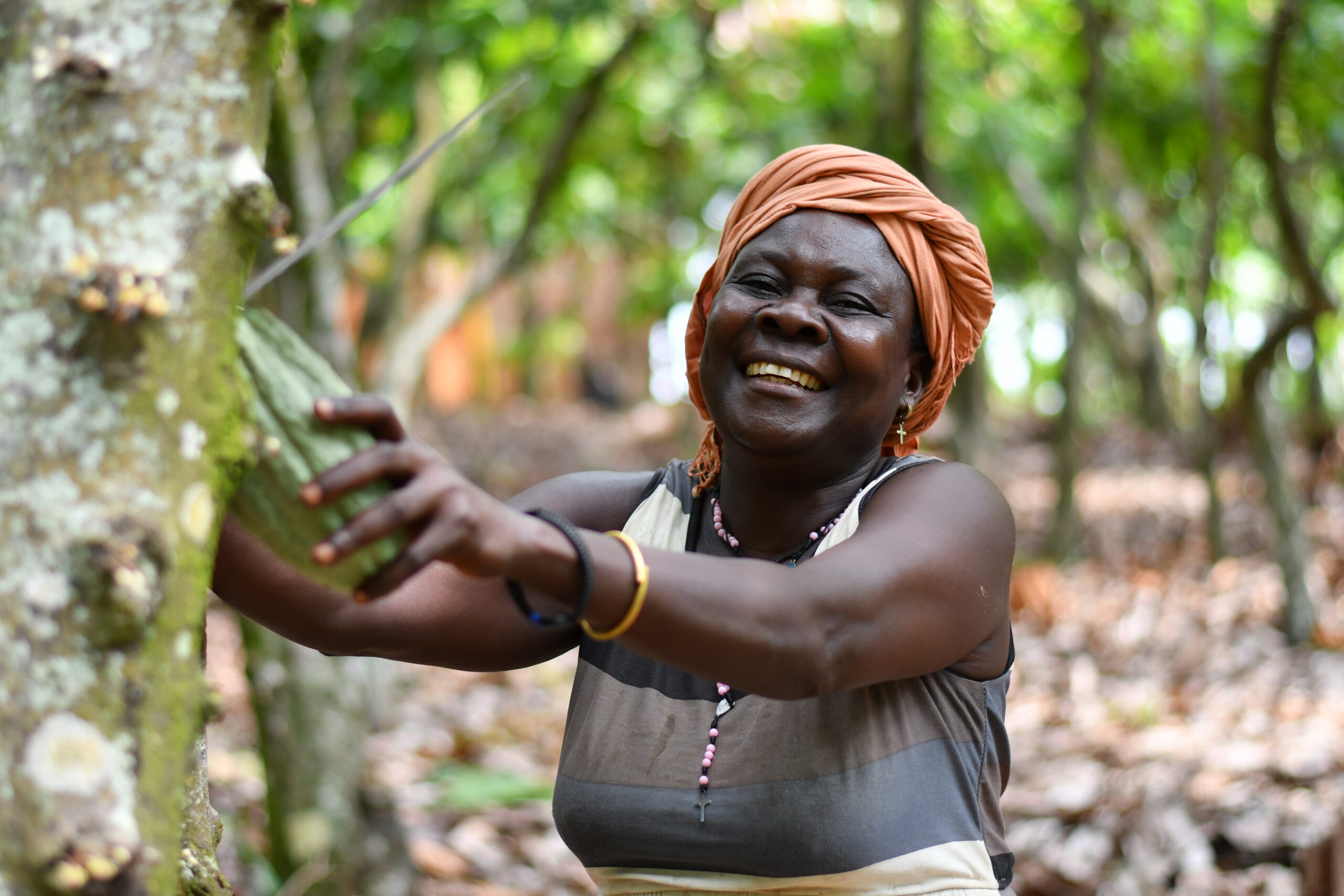
In Uganda’s cocoa sector, we initiated a study to measure the impact of the Gender Action Learning Systems (GALS) methodology on household economic empowerment, focused on decision-making, resource access, and division of labor. The findings will provide concrete evidence of how gender-transformative approaches lead to equitable outcomes.

In Kenya, maize farmers widely adopted certified seeds (84%), crop rotation (74%), and diversification (67%), which improved food security, with concerns decreasing from 26% to 13.5%. In Ethiopia, 591 ha under climate-smart practices yielded 4.9 tons, generating ETB 159 million (Euro 1.058 million). 71% of farmers, previously reliant on government food assistance, achieved surplus production and self-sufficiency.

In Ethiopia, Solidaridad East Africa installed waste management equipment at Modjo TVET and Colba and Modjo tanneries, reducing effluent chloride by 13.8% (from 19,693 to 17,310 mg/l) and benefiting soil and water. Our innovations also enabled glue (200 kg of glue daily from 400 kg of lime trimming waste) and protein production (converting 800 kg of chrome shaving waste into 540 kg of protein hydrolysate) from tannery waste.
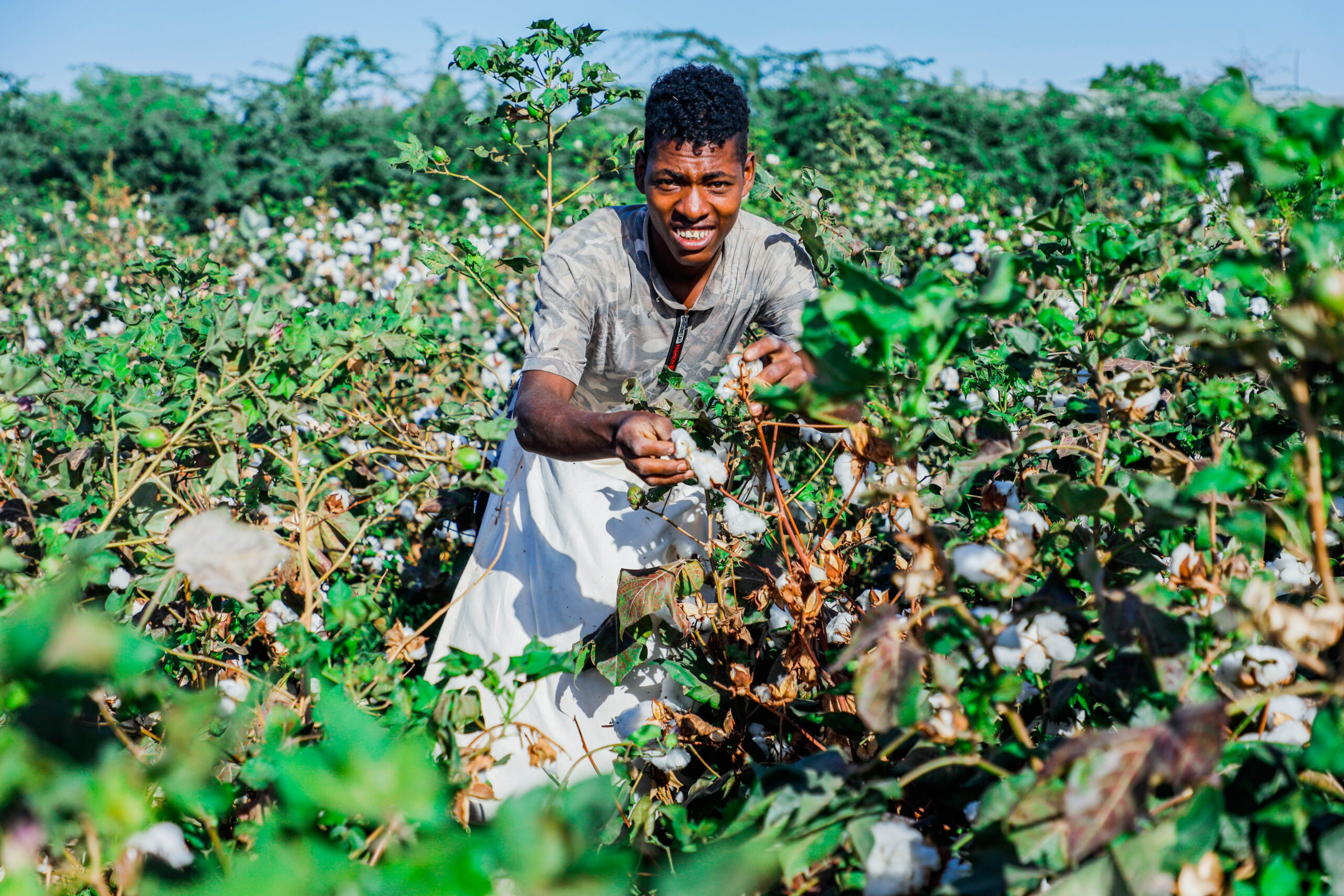
Following the approval of the Proclamation #1923/2023’s in Ethiopia, we facilitated a contract farming model. This enhanced price fairness, traceability, and farmer incomes, and was adopted as a top business model by the Ethiopian Government. The Development Bank of Ethiopia also recommends it for textile loans.
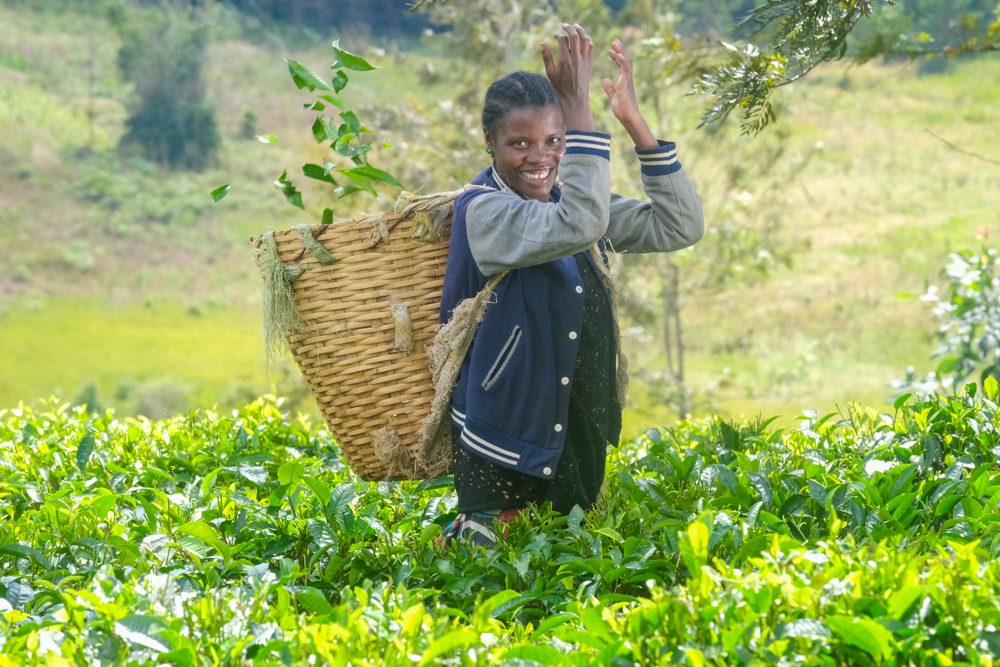
Solidaridad East Africa’s support enabled 16 tea farmers to establish specialty tea businesses, gaining access to European and local specialty tea markets. A total of 1.1 MT of high-value specialty tea was sold at Euro 5.5 per kg, compared to Euro 1.1 per kg for conventional tea—a 69% price increase directly benefiting farmers.
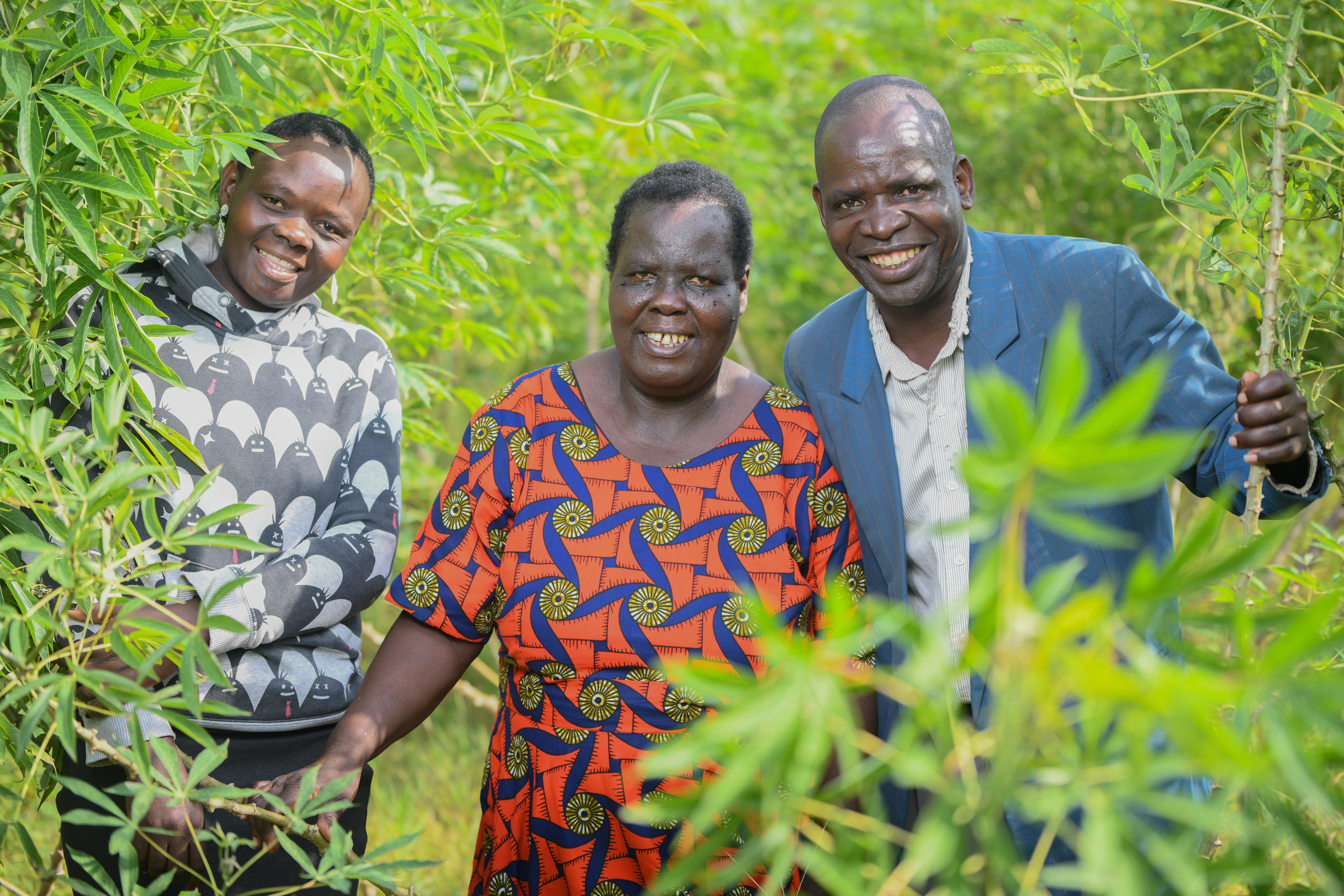
In Kenya, the Kenya National Farmers Federation Market Information System onboarded 336,375 farmers and 2,471 farmer groups, providing real-time access to crucial market trends, pricing, and trading opportunities. The Viazi Soko platform, managed by the National Potato Council of Kenya, connected 116,000 potato farmers with 218 service providers, successfully improving digital marketing, information dissemination, and supply chain efficiency in the potato sector.
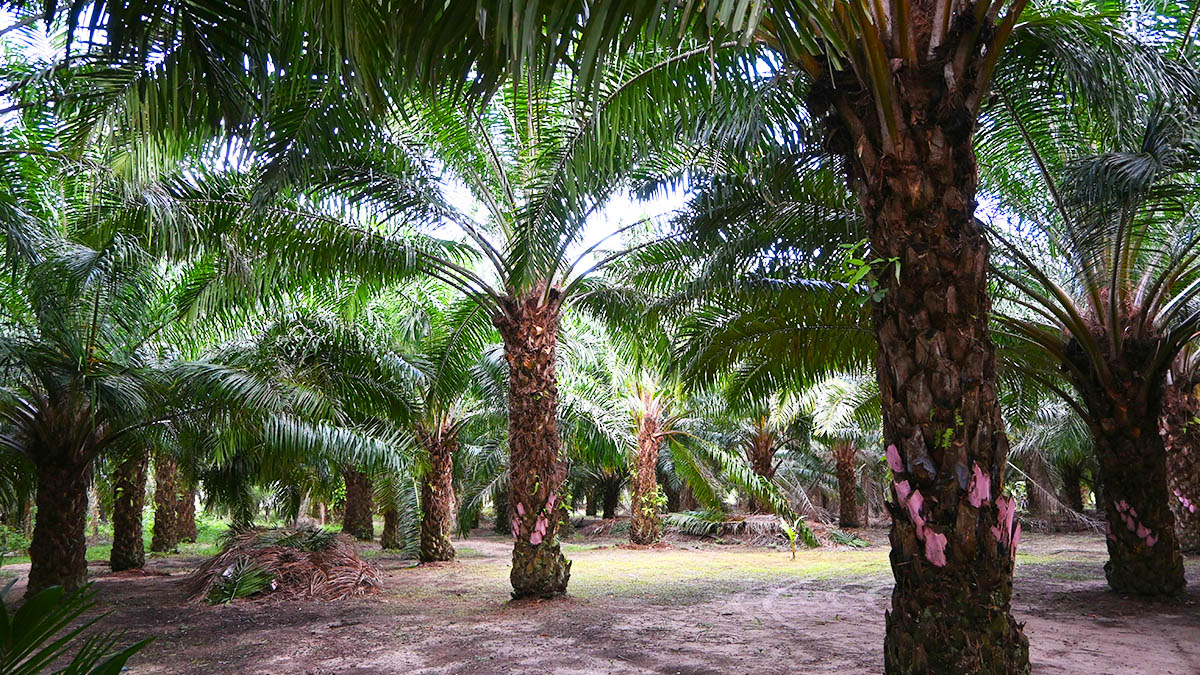
In Uganda, our flagship oil palm project expanded sustainable land management, engaging over 3,900 farmers who put 7,800 hectares under sustainable cultivation.
Results
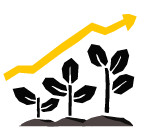
176,547
farmers with improved yield (kg/ha)

133,923
farmers with farm income increase

207,169
Farmers and miners with access to improved services
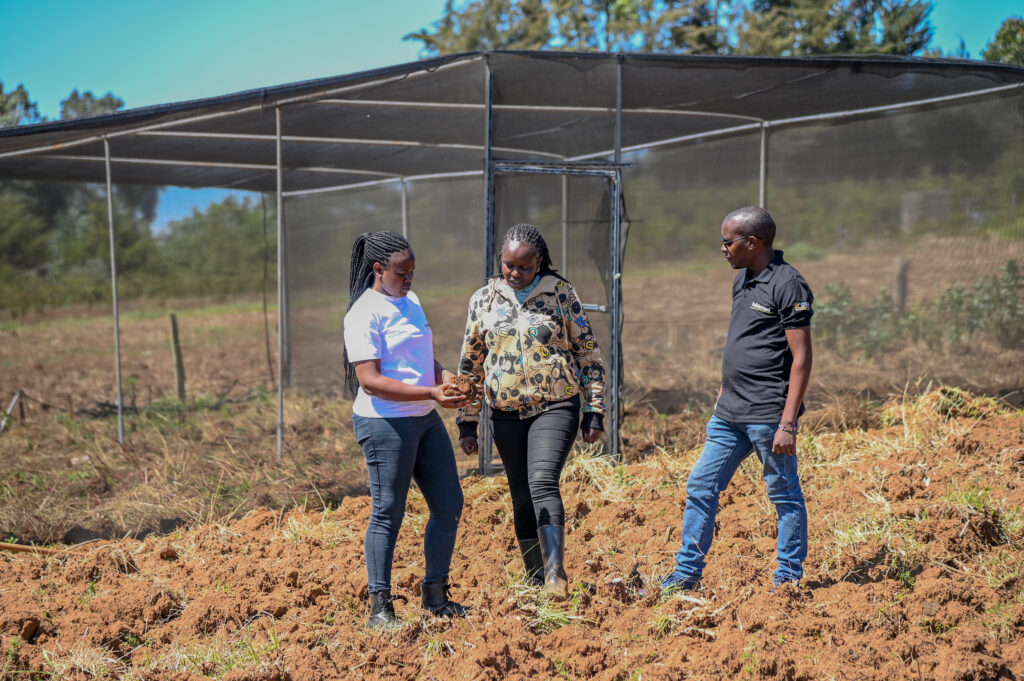
Building a lasting impact
SUSTAINABLE ACHIEVEMENTS 2024
Solidaridad East and Central Africa’s 2024 achievements reflect our holistic approach to sustainable development across agriculture, industry, and mining. By leveraging strategic partnerships, robust policies, innovative solutions, and cutting-edge technologies, we have empowered producers, strengthened communities, and enhanced market access. Our efforts have driven measurable environmental, economic, and social impact, fostering resilience and inclusive growth across the region.
In 2024, Solidaridad East and Central Africa accelerated producer-led transformation across agriculture, mining, and industry. We deepened collaboration and partnerships to build capacities and achieve a stronger balance between production and nature while accelerating prosperity and inclusivity outcomes for farmers, workers, and miners.
Building on our 2023 progress, we supported 176,547 farmers in Ethiopia, Kenya, Uganda, and Tanzania to enhance their agricultural practices. 133,923 (81.7%) farmers reported increased farm yields and incomes, demonstrating a strong link between good on-farm, harvest, and post-harvest management practices and economic benefits. Insights on household incomes from our horticulture project evaluation showed that on-farm diversification significantly boosted farmer resilience by enhancing income security and countering income instability. 66.7 percent of the sample households relied on both crop and livestock farming, underscoring the critical role of diversification.
Farmers embraced climate-smart technologies, including soil and water conservation techniques like drip irrigation, mulching, zai pits, and terracing. They also integrated agroforestry systems, implemented responsible agrochemical, as well as organic input usage, through composting and vermicomposting, and focused on quality planting materials and effective soil fertility, and pest- and disease management.
Local food farmers increasingly adopted our project-promoted technologies. Maize farmers in Kenya recorded wide adoption of certified seeds (84%), crop rotation (74%), and diversification (67%) directly impacting their yields and household food security, with food quality and adequacy concerns dropping from 26% to 13.5%. In Ethiopia, 591 hectares cultivated using advanced climate-smart practices, produced 4.9 tons (4,000 tons Irish potatoes, 900 tons haricot beans, and 11 tons mung beans), representing a 25% increase in food output and productivity, and generating €1.058 million. As a result, 71% of the targeted farmers, previously reliant on government food assistance, achieved surplus production and self-sufficiency.
Farmers implementing sustainable land management practices grew significantly in 2024, with 167,000 hectares under sustainable management, up from 149,000 hectares in 2023. Our flagship oil palm project contributed to this, with over 3,900 farmers, putting 7,800 hectares under sustainable cultivation. Agroforestry further accelerated this milestone. As of December 2024, 298,826 agroforestry tree seedlings had been distributed to 10,336 coffee and food crops farmers in Uganda (7,965), Tanzania (973) and Kenya (1,398).
In the industrial and mining sectors, we made significant strides by advancing the adoption of good processing, manufacturing, and waste management practices. In Ethiopia’s leather industry, we installed three waste management equipment for salt reuse, glue production, and protein extraction at the Modjo TVET College, Colba, and Modjo tanneries. The innovations reduced tannery environmental impact and created value from waste products. The salt reuse equipment reduced chloride levels in tannery effluent by 13.8% (19,693 mg/l in the control sample compared to 17,310 mg/l in the experimental sample), a substantial reduction that stands to benefit the environment by lowering soil and water salinity, addressing the resultant plant stress, and growth, and aquatic toxicity.
The leather sector realized tangible results in waste transformation and value creation. Colba Tannery and Modjo TVET College now produce 200 kg of glue daily from 400 kg of lime trimming waste, providing a sustainable, local alternative to imported adhesives and benefiting the construction sector. Furthermore, Colba Tannery enhanced its position as a center of excellence in solid waste management, converting 800 kg of chrome shaving waste into 540 kg of protein hydrolysate, replacing costly imported leather fillers. These innovations strategically drove sustainability, created jobs, and added significant value to the local leather industry. Addressing environmental and safety concerns in the Artisanal and Small-Scale Gold Mining sector remained a core focus. 6,531 miners were reached through targeted education on, among others, geological concepts in Kenya and Tanzania, and Uganda. In Kenya and Tanzania, the training reduced land pollution, evidenced by fewer new and abandoned pits. To address mercury pollution, Solidaridad, designed and distributed 130 improved retorts to 130 mines, and delivered training on personal protective equipment, leading to a 99% reduction in mercury vapor emissions during gold processing. By providing occupational health and safety training and enforcing robust standards, we also improved working conditions for 6,531 miners. Across the region, training on personal protective equipment and the other initiatives promoted both miner health and environmental protection.
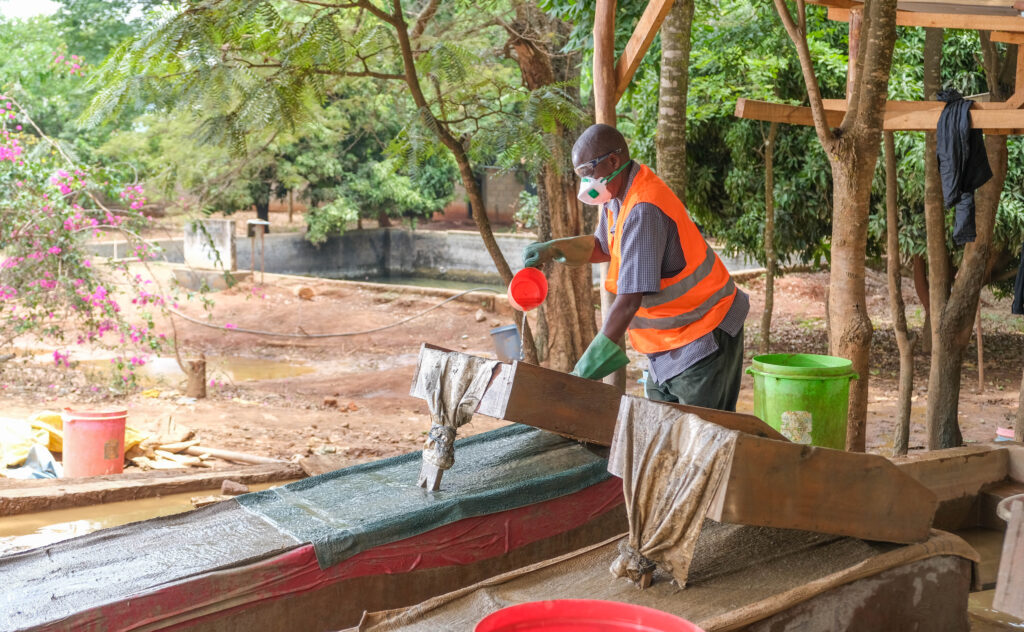
Solidaridad East and Central Africa delivered integrated support to small-scale producers, producer-led enterprises, and Micro, Small, and Medium Enterprises responding to the interconnected nature of their challenges. By focusing on both operational and financial efficiency, our initiatives addressed key needs. These included building farmer cooperative leadership and governance capacity, enhancing marketing skills, financing viable business cases like nurseries, facilitating access to essential inputs through service provider connections, and expanding financial inclusion, paving a pathway to sustainable growth.
As a result, service providers improved access – availability, accessibility, and affordability – to essential inputs and services for farmers and artisanal miners. This resulted in 207,169 farmers accessing critical inputs, engaging with service providers, or benefiting from vital services. Furthermore, by collaborating with farmer procedure organizations, Solidaridad optimized service delivery, reduced input costs through collective purchasing, and streamlined produce aggregation, empowering farmers to access more favorable markets and pricing.
Throughout the year, we strategically advanced access to finance for smallholder farmers and miners, recognizing the critical financial barriers these sectors face. Our efforts focused on three key areas: enhancing the investment readiness of producer enterprises through targeted capacity-building, facilitating vital linkages between producer groups and financial institutions, and promoting innovative financing mechanisms such as digital financial services and microfinance.
We built investment readiness for four tanneries and 150+ farmer cooperatives through capacity-building and linkages with financial institutions. This directly resulted in outcomes like Bushika Integrated, a Ugandan cooperative, securing Ugx 277 million (66,630 Euro) in working capital. This funding enabled the cooperative to purchase and process a container of coffee for export, which facilitated coffee sales to premium European buyers, generating increased revenue and resulting in 6.2% better prices for farmers, positively impacting over 2,800 coffee farmers. Active cooperative membership also grew marginally from 1,889 to 2,015. We catalyzed transformative growth in 11 Tanzanian coffee cooperatives with Tshs 534 million (185,000 Euro) seed funding. Nine cooperatives established input shops, and two modernized processing, resulting in 5,417 new jobs for women and youth. These efforts enhanced economic independence, community resilience, and sustainable coffee systems.
Our capacity-building and support in the tea sector enabled the National Association for Women in Tea Uganda to secure a Ugx 98 million (23,708 Euro) grant from the Women Grow Fund, directly empowering women in the specialty tea production. The association also secured a partnership with PUM Netherlands to drive economic empowerment for women in the sector through value addition and market access. PUM’s support will facilitate the acquisition of tea processing machines, access to advanced training and markets, and financial empowerment through a women-led tea Savings and Credit Cooperative Organization (SACCO).
Sustained efforts to expand financial inclusion, particularly through Village Savings and Loan Associations (VSLAs), yielded results. In Ethiopia’s leather sector, VSLAs empowered women economically, facilitating the establishment of income-generating activities (poultry, livestock, and small businesses). In Tanzania’s coffee sector, 2,540 women in 75 VSLA groups successfully mobilized Tshs 943,841,500 (Euro 320,000). This capital enabled investments in sustainable practices, essential inputs, and diverse income-generating ventures, demonstrating the VSLA model’s effectiveness in driving financial inclusion for rural communities.
Technology accelerated transformation in all our focus supply chains, significantly enhancing market transparency and accessibility. Through our local food projects in Kenya, the Kenya National Farmers Federation Market Information System onboarded 336,375 farmers and 2,471 farmer groups, providing real-time access to crucial market trends, pricing, and trading opportunities. The Viazi Soko platform, managed by the National Potato Council of Kenya, connected 116,000 potato farmers with 218 service providers, including six seed companies, three fertilizer companies, five agrochemical companies, one soil testing provider, four potato processors and traders, one logistic company, 72 spray service providers, and 126 farm service providers. The platform, integrated with a web portal, mobile app, and USSD system, successfully improved digital marketing, information dissemination, and supply chain efficiency in the potato sector.
Knowledge transfer remained a critical enabler for farmers and miners. Our projects employed a comprehensive approach, including the Trainer-of-Trainer model and practical demonstrations to provide direct access to best practices in agriculture and mining. In collaboration with the trainers-of-trainers, lead farmers, and gender champions, we ensured that knowledge and skills were embedded in communities. Field days, exchange visits, expos, and multi-stakeholder platforms served as vital hubs for collaborative knowledge exchange, fostering direct engagement between our farmers, and miners, industry experts, and peers and facilitating wider adoption of impactful solutions. Complementing these efforts, digital channels (such as bulk messaging) significantly expanded access to crucial market data, safety protocols, and sustainable practices, ensuring even remote communities were equipped with essential information. This multi-faceted approach to knowledge sharing acted as a powerful catalyst, enabling farmers and miners to enhance their livelihoods and contribute to sustainable resource management.
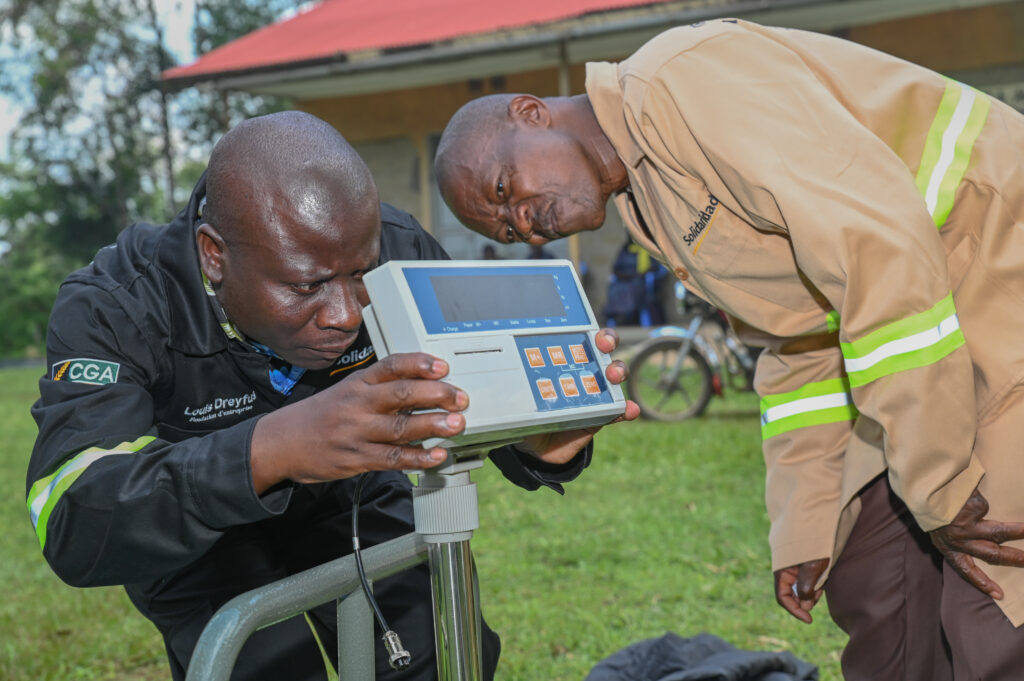
Driven by a commitment to equitable and sustainable supply chains, Solidaridad East and Central Africa’s 2024 activities centered on amplifying the voices of producers. We achieved this through a multi-pronged approach: empowering producer organizations to actively shape policy, strengthening inclusive multi-stakeholder platforms for collaborative decision-making, championing transparent supply chains via digital traceability, and partnering with governments to embed inclusive, climate-adaptive, and regenerative practices into national policy frameworks. These integrated efforts aimed to ensure producers’ influence on key decisions, foster fair market regulations, and drive transformative change.
As our regional policy influencing programme approached its fifth year, 2024 marked a peak in advocacy engagements, necessitating robust coordination with civil society organizations and multi-stakeholder platforms. This heightened activity resulted in increased CSO participation in shaping policies across tea, coffee, local food, gold, cotton, and textile supply chains. The number of CSOs actively influencing policy rose from 43 in 2023 to 57 in 2024. Furthermore, citizen mobilization efforts under the programme successfully engaged 76,000 citizens across Ethiopia, Kenya, and Uganda, effectively amplifying their voices in critical policy discussions.
Our policy-influencing efforts yielded significant advancements in the agriculture and mining sectors, enhancing transparency, sustainability, and smallholder protections. These producer-driven advocacy initiatives resulted in policy enactments and reforms.
Kenya’s tea sector saw the successful enactment of crucial tea sector regulations, including the Tea (Levy) and Tea (Licensing and Registration) Regulations, as well as the adoption of Corporate Governance Guidelines and a Code of Conduct. Furthermore, Regulatory Impact Statements and manuals were developed for the election of representatives to the Tea Board of Kenya, ensuring representation for small, medium, and large-scale tea growers and traders. Green Leaf Quality and Tea Blending requirements were also established. Moreover, key recommendations from the Kenya Coffee Producers’ Association were integrated into the Kenya Coffee Bill, and proposals for the Cooperatives Bill 2024 were submitted to the National Assembly.
Uganda witnessed progress in food safety and mining regulations. In partnership with the Consumer Protection Association of Uganda, a Maximum Residue Limits (MRL) Policy Paper was developed to regulate pesticide use. Five civil society organizations – Advocacy Coalition for Sustainable Agriculture (ACSA), Slow Food International, Hortifresh, HORTEXA, and Pelum – collaborated on a Plant Genetics Position Paper, submitted to the Ministry of Agriculture for adoption. Additionally, the Uganda Mining (Licensing) and Regulations for Artisanal and Small-scale Mining were finalized and submitted for ministerial approval.
Ethiopia’s garments and textile sector benefited from the development of an Integrated Management System (IMS) guideline aimed at supporting global compliance, market access and policy recommendations for the Ethiopia Cotton Marketing System, advocating for a minimum support price for farmers. Crucially, parliamentary approval of Proclamation #1923/2023 established a regulatory framework for agricultural contract farming. Following this milestone, Solidaridad facilitated the implementation of a contract farming model, benefiting seven organic cotton producer cooperatives and Gamo development associations, enhancing price fairness, traceability, and farmer incomes. The model’s success was recognized by the Ethiopian government, which adopted it as one of their top three business models. Further validating its effectiveness, the Development Bank of Ethiopia now recommends its inclusion in textile factory loan applications, facilitating greater financial access for cotton producers.
In 2024, Solidaridad East and Central Africa focused on empowering small-scale producers to thrive in competitive markets by enhancing market access, financial resilience, and value chain transparency.
Our revamped blockchain-based Solichain system onboarded 16,000 farmers, automating commodity tracking and enhancing transparency. This system automates farm-to-consumer tracking, delivering greater transparency, streamlined communication, and enhanced accountability across multiple value chains and countries. Stakeholder workshops were conducted to validate system functionality in readiness for full-scale testing planned for 2025. In partnership with the Progreso Foundation, we piloted Beyco, a digital market platform designed to enhance market access for East African coffee. Beyco directly connects coffee buyers with producers, fostering transparency and traceability. The platform successfully onboarded five farmer groups and 15 estate farmers in Kenya, strengthening direct-to-market sales opportunities.
To expand market access, we engaged key stakeholders and buyers through regional and international events. Participation in the Specialty Coffee Association Exhibition (USA), the African Fine Coffees Association Conference (Ethiopia), and the 24th Annual Africa Business Forum facilitated the forging of valuable partnerships and buyer connections. These forums provided platforms to showcase premium African coffees and engage with stakeholders across global value chains. Notably, coffee cupping sessions offered buyers firsthand experience, attracting interest from leading companies, including Starbucks, Volcafe, Touton, ECOM Group, Pino Coffee, and Africa Coffee Roasters.
We strengthened market connections for Kenyan farmers by hosting the first Nairobi Coffee Exchange cupping session, engaging 150 farmers from eight counties. Farmers, who submitted 40 samples for sampling, engaged with buyers, and gained critical market insights (trends and pricing strategies). Building on our achievements promoting organic coffee farming for farmers in Kenya, we spearheaded the European Organic System certification process, which will see two estates and three cooperatives undergo rigorous audits for certification in 2025. Our commercial partner, African Coffee Roasters, will deliver Kenya’s first organic-certified coffee to global markets in 2025, securing premium prices for at least 2,521 farmers.
Our business-to-business initiatives and matchmaking efforts further catalyzed a transformative shift in the agricultural landscape for small-scale farmers in the region. In Ethiopia, we secured Euro 0.73 million in pre-sale contracts for haricot beans between farmer organizations and buyers. In Tanzania, 10 market linkages facilitated exports of 379.34 MT of horticultural products, coffee, and tea. In the cotton sector, our contract farming model expanded market linkages for 800 cotton farmers in Ethiopia. This model resulted in a yield of 500 tons of organic cotton across 1,000 hectares, generating Euro 0.2 million – an 11% increase over pre-agreement earnings.
In Kenya, we supported maize farmers to establish 10 producer groups that merged into three aggregation centers. The centres were equipped with shellers, moisture meters, tarpaulins, pallets, digital weighing scales, and record-keeping tools to enhance efficiency and reduce post-harvest losses. Between July and September 2024, one centre served 520 farmers, generating Kshs 208,000 (Euro 1,486) in shelling income and aggregating 55.8 MT of maize valued at Kshs 1.86 million (Euro 14,418.60). Annually, the three aggregation centres are projected to serve 4,197 farmers, aggregate 755.46 MT of maize valued at Kshs 25.8 million (€195,209.30). These interventions improved collective bargaining power, enhanced market stability, and boosted farmer incomes.
Through our carbon farming initiative, we achieved 20,718 tCO2eq sequestration and sold 11,530 Carbon Removal Units (CRUs) to Microsoft via ACORN, generating Euro 273,738 for 5,499 Ugandan farmers managing 23,787 hectares—a 42% increase from the previous year’s 7,700 CRUs. In Kenya, 6,000 farmers who received training in climate-smart practices realized yield improvements from 2 kg to 5 kg per coffee tree, and sequestered 1,327 CRUs. In the tea sector, 16 farmers established specialty tea businesses, gaining access to European and local specialty tea markets. A total of 1.1 MT of high-value specialty tea was sold at Euro 5.5 per kg, compared to Euro 1.1 per kg for conventional tea—a 69% price increase directly benefiting farmers.
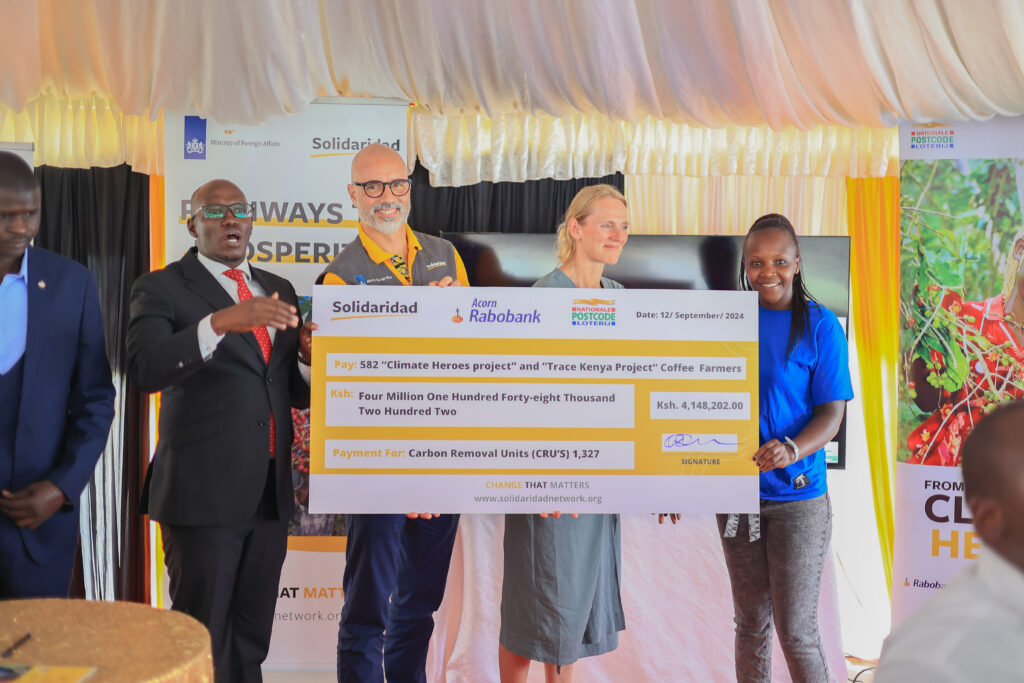
The Responsible Mineral Credit system, a collaboration between Solidaridad, the Impact Facility, and Fairphone, offered financial incentives to promote responsible artisanal and small-scale gold mining in Tanzania. This mechanism delivered three key benefits:
- encouraged the adoption of environmentally sound mining practices, reducing ecological impact;
- improved market access for miners adhering to compliance standards, securing better prices; and
- successfully attracted three downstream companies committed to sourcing responsibly mined gold from Solidaridad’s supported mines.
Through its focus on supply chain transparency and ethical sourcing, the system is facilitating a shift towards sustainable artisanal and small-scale mining practices in Tanzania.
Change stories
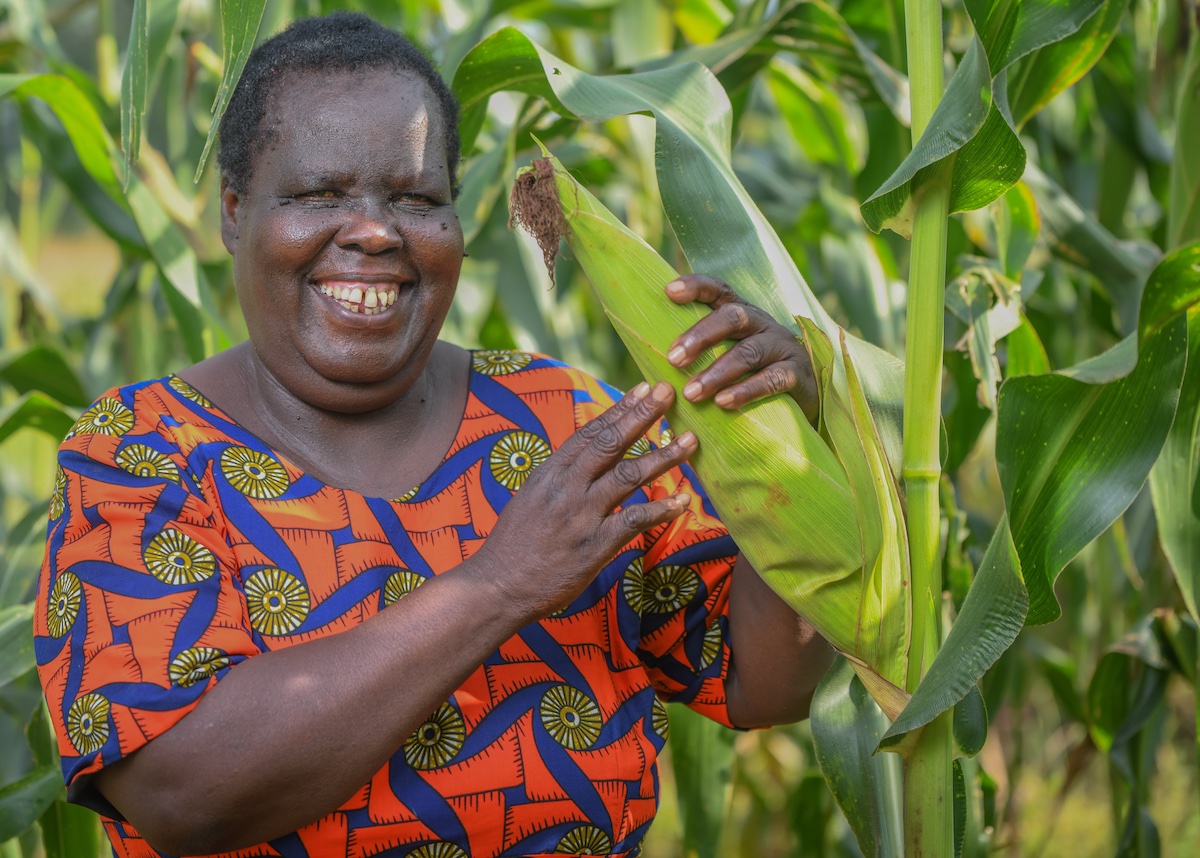
Jackline Sakwa, a 63-year-old Kenyan farmer, has seen a remarkable increase in her maize harvest thanks to a project designed to support sustainable farming practices, increase farmers’ resilience to climate change, and advance gender and social inclusion in Bungoma County by 2025. After just two years, the Creating Shared Value in Maize Value Chain in Kenya project has led to increasingly bountiful harvests with farmers like Jackline seeing livelihood improvements
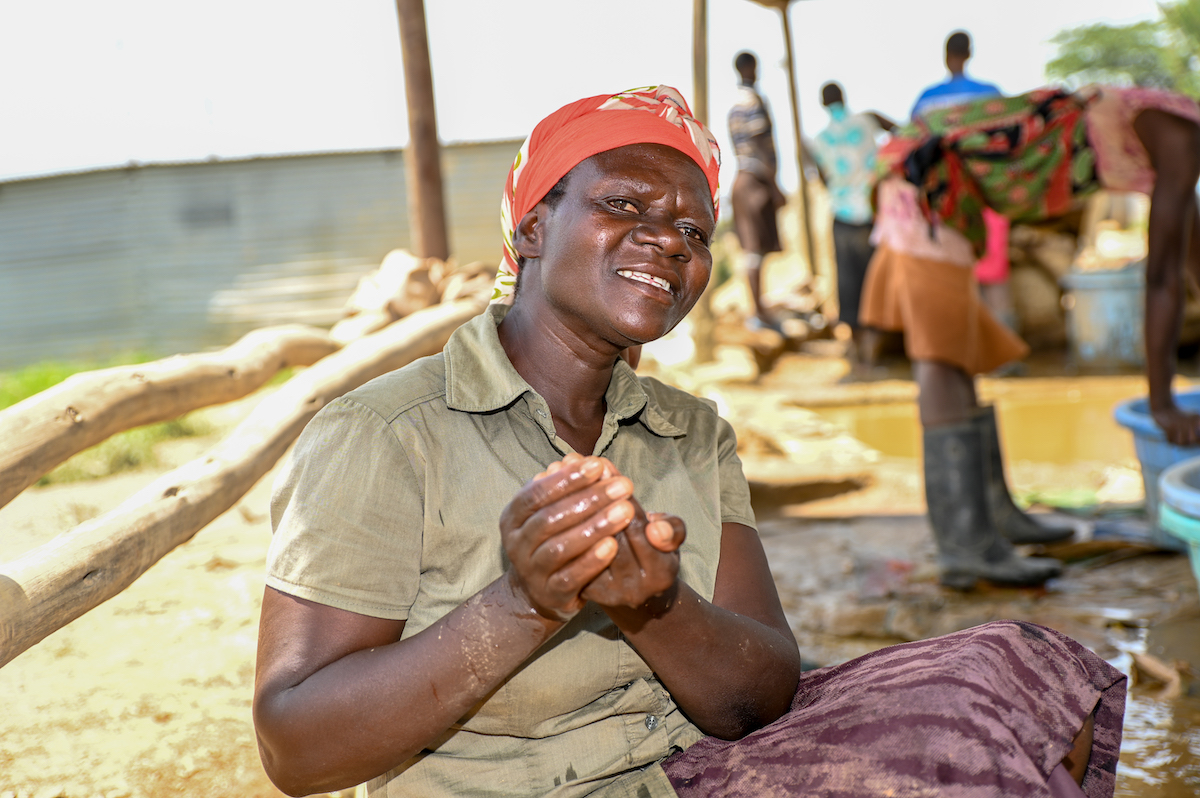
Women play a vital role in Kenya’s artisanal and small-scale gold mining sector, but they face significant challenges. Exposure to harmful substances, long hours, and low pay are common. Eunice Atieno, a dedicated miner, is working to improve conditions for women in her community. She is raising awareness about safety, advocating for fair wages, and inspiring other women to demand better working conditions as they strive for a brighter future.
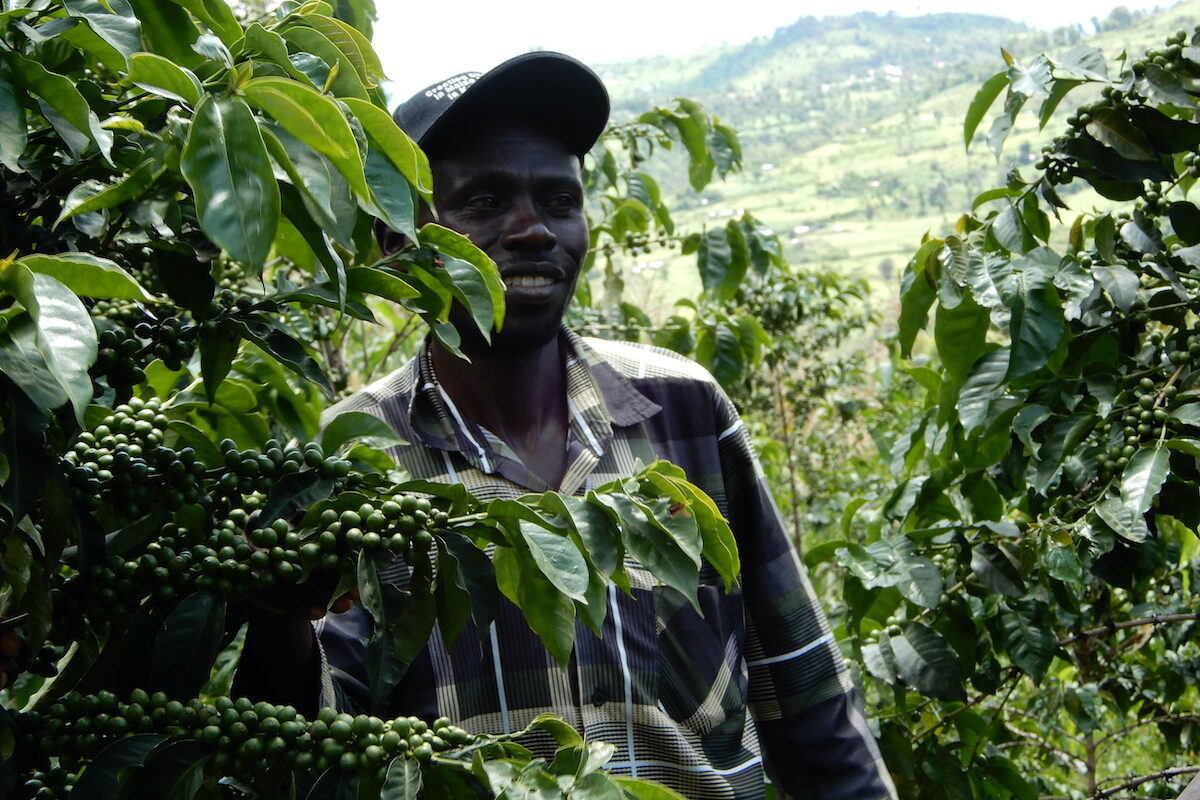
Like many, Richard Rono is seeing the real time impacts of climate change. Unpredictable rainfall has resulted in lower coffee yields for this Kenyan coffee farmer, but Solidaridad’s TRACE Kenya project is helping him build up his resilience. Organic farming practices have boosted his harvest and now Richard is sharing what he’s learned with others in his community as a lead farmer.
Innovative Sustainability Solutions
Innovation for change
In 2024, Solidaridad East and Central Africa prioritized innovative solutions across multiple sectors, from advancing gender equality to implementing digital platforms for improved efficiency.
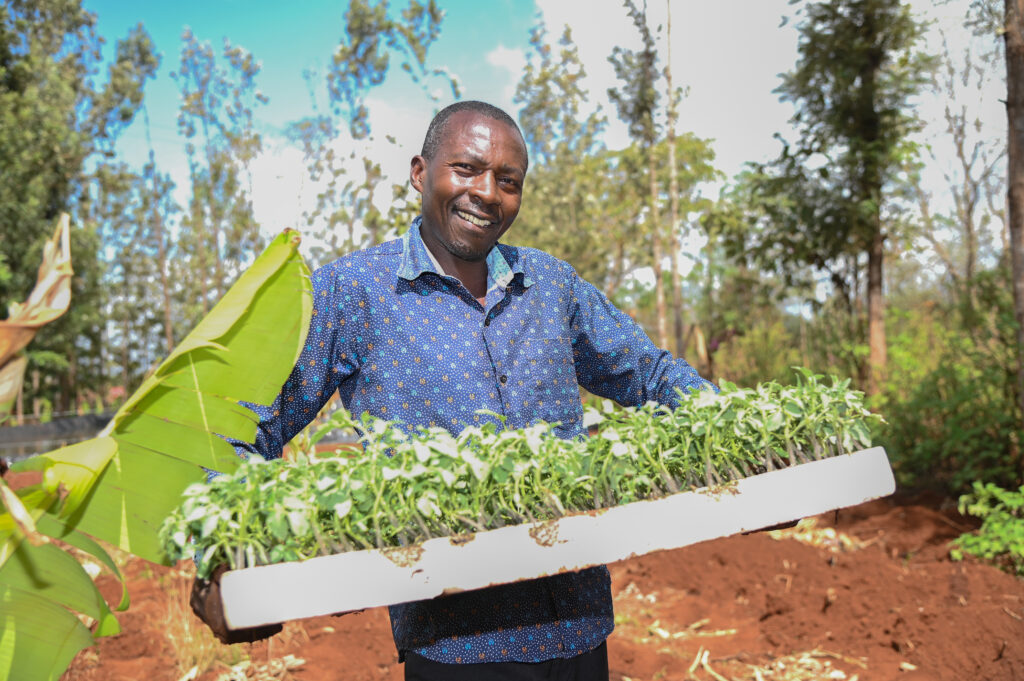
In 2024, we drove transformative solutions to advance gender equity. In Kenya and Uganda, we conducted learning assessments in the coffee and tea sectors. These assessments, supported by a learning agenda, revealed critical barriers to meaningful participation of marginalized producers, particularly women, in multi-stakeholder platforms, underscoring the need for tailored strategies that address socio-cultural and economic barriers, ensuring their voices are heard and valued.
We continued to expand and strengthen Gender Smart Villages, an approach that empowers gender champions through training in methodologies like Start Awareness Support Action, Gender Action Learning Systems (GALS), engaging men in accountable practices, and Economic and social empowerment, enabling them to engage households and communities on gender and inclusion. In Uganda’s cocoa sector, we initiated a study to measure the impact of the GALS methodology on household economic empowerment, focused on decision-making, resource access, and division of labor. The findings will provide concrete evidence of how gender-transformative approaches lead to equitable outcomes.
In Ethiopia, our efforts sought to advance gender-inclusive monitoring, evaluation and learning systems for equitable and transformative impact. We are positioned to support key partners in gender-specific monitoring and evaluation, to catalyze the development of robust systems that accurately capture gender-specific indicators.
In Kenya and Tanzania’s gold and coffee sectors, we drove economic empowerment by combining value-addition training with market access for women and other marginalized groups.
Solidaridad deployed Nature Based Solutions, to address climate challenges and promote sustainable practices. In Kenya and Tanzania, we collaborated with like-minded organizations on training and conducted field visits to foster co-creation of agroforestry designs. Through this approach, we sought to drive adoption, ownership, and scalability of practical agroforestry solutions, demonstrating best practices for achieving diverse climate action benefits in agriculture.
Several pilots were conducted exploring biochar as a scalable solution for enhancing soil health and resilience achieved CERES Certification for Environmental Standards in November 2024. Beyond soil health improvements, biochar is envisaged to provide mitigation co-benefits, diversify climate action strategies in East Africa, and create potential revenue opportunities for farmers through international carbon markets.
Solidaridad launched a “pay-for-impact” project to demonstrate viability of insetting initiatives and attract corporate investment. We also prioritized regulatory compliance, following Kenya’s carbon market regulations by conducting impact assessments, and engaging with authorities in Ethiopia, Tanzania, and Uganda.
Throughout the year, we prioritized proactive adaptation, resulting in the refinement of our Climate Vulnerability Assessment (CVA) tools, designed to monitor the impact of climate variability and change on farmers, farms, and ecosystems. To enhance our ability to anticipate and forecast risks, a Disaster Risk Reduction component will be integrated into our Climate Adaptation Index tool, with further refinements planned for subsequent years.
To improve our carbon pre-financing, we conducted a stakeholder review (farmers, providers, partners). The feedback highlighted the need for: periodic SMS updates on Carbon Removal Units, increased seedling allocation (beyond 25 trees for larger farms), and customized seedling selection (e.g., Meiopsis eminii). This emphasizes a farmer-centric design approach, prioritizing consistent communication, flexible resources, and localized solutions for greater impact.
A regional mapping and evaluation of our service provision models revealed tea and coffee as dominant value chains, with input supply and advisory services being most common. Agronomic advice and seeds were the most preferred interventions. Advisory services had the highest uptake among farmers across the region. Loans were the primary financial service, while post-harvest support focused on storage and market linkages. Waste valorization was limited, except in Ethiopia’s leather sector. Enterprise-led models dominated service provision, supplemented by farmer and government initiatives.
As part of the ANDE Climate Action Lab, we supported the design of a Technical Assistance Facility and an Investment Fund for waste management and circularity. The Technical Assistance Facility is providing coaching to 11 entrepreneurs on sales, marketing, finance, and waste valorization for investment readiness.
We also developed strategic business cases for our interventions, using scenario analysis to minimize farmer risk and maximize returns. These models include: one for private-sector partnerships to assess the feasibility of acquiring external finance for organic fertilizer manufacturing and distribution, and two for conservation interventions focusing on agroforestry, organic manure, and biochar.
To strengthen climate change and emissions reporting, we developed a Measurement, Reporting, and Verification system. Integrated with the Cool Farm Tool, it tracks emissions of carbon dioxide, nitrogen oxide, and methane in the dairy, encompassing enteric fermentation, feed and manure management, grazing land, transport, energy, and processing. Key features include data filtering by assessment year, administrative level, and farmer cooperative, as well as a validation module that provides auditors/verifiers with access to raw data and calculated emissions for independent verification. Planned enhancements include expanding the system to support measurement and reporting for crops value chains.
We also developed a quality-based milk payment system, featuring three specialized mobile applications for farmers, milk collectors, and dairy hubs, alongside a comprehensive web-based dairy hub management dashboard. Functionalities include dairy hub and farmer registration, operations management, milk collection with fat and water content measurements, quality-based milk pricing, sales and payment management, profit and loss reporting, and farmer-centric service provision management. The system supports multiple dairy hubs and offers bilingual support (English, Oromifa, and Amharic) to enhance user experience. Currently, the system is being piloted in Ethiopia.
To streamline financial services for farmers, we commissioned the development of a payment and loan management system. This solution automates input pre-financing and payments for carbon removal, featuring functionalities such as farmer profiles with wallets, loan applications and management, automated loan deductions, and portfolio management. It also includes mobile money wallet verification and end-to-end payment integrations, supporting approval flows in Kenya, Tanzania, and Uganda.
Organization & governance
Optimizing Operations, Maximizing Impact
Throughout 2024, we prioritized organizational strengthening. We enhanced our capacity for sustainable impact through strategic evaluations, improved HR, impactful communication, and robust financial management. This focus ensured greater resilience and effectiveness across all sectors, positioning us for continued growth and success.
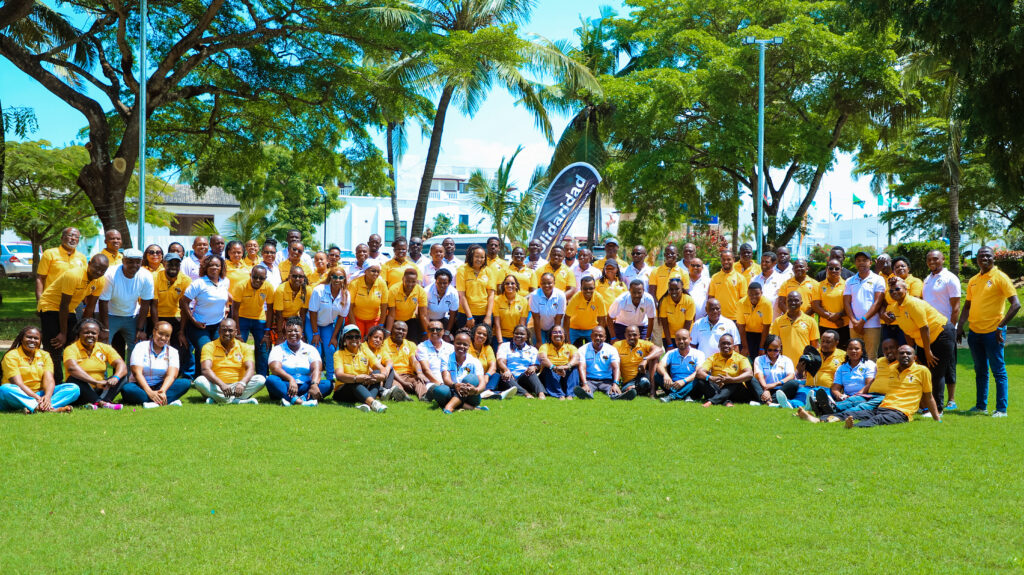
A key outcome was the confirmation of the strategy’s continued relevance, with over 90% of our external stakeholders affirming its alignment with local, national, and global priorities. The human-centered approach, addressing institutional systems and enabling environments, was highly commended for its contribution to environmental conservation, income generation, and sustainable markets.
The review highlighted both successes and areas for improvement across our four thematic areas: Good Practices, Supportive Business Ecosystems, Enabling Policy Environments, and Market Uptake. Notably, 92.3% of stakeholders were satisfied with Good Practices interventions, despite challenges like climate change and market volatility. In Supportive Business Ecosystems, 82% were satisfied, though addressing service delivery inefficiencies remains a priority. Similarly, 82.05% were satisfied with Enabling Policy Environments, while addressing policy implementation delays remained crucial. Finally, 71.8% were satisfied with Market Uptake interventions, with a focus on enhancing producer bargaining power.
The Mid-Term Review highlighted critical areas for our next strategy (2026-2030): agile adaptation to external shocks like climate change and market volatility; improved service delivery efficiency through sustainable, scalable models; enhanced policy influence via stronger government relations and cost-effective advocacy; strengthened market uptake by focusing on fair value chains and producer empowerment; and integrated climate resilience across all programs. Our 2026-2030 strategy will prioritize these areas to ensure continued impact and sustainability.
We also deepened and diversified our partnerships to maximize impact across the region. Recognizing the power of collaboration, we forged stronger ties with national and local governments, businesses, and donors to achieve our shared goals. This collaborative approach yielded significant successes. We secured key projects, such as the DANIDA-funded Harvesting Carbon Initiative in Uganda, the Climate and Clean Air Coalition-funded National Methane Reduction Implementation Strategy in Kenya, and the Starbucks-funded Project to Strengthen Monitoring Capacity for Starbucks in Uganda.
Building on our existing collaborations, we also maintained and strengthened relationships with governments in our focus countries, including the signing of an Memorandum of Understanding with the County Government of Makueni in Kenya, and enhanced engagement with Uganda’s Ministry of Agriculture, Animal Industry and Fisheries. Our engagements with the private sector, including Starbucks, Kenbright, and EcoSecurities, played a vital role in advancing our sustainable solutions across value chains.
Despite the shifting donor landscape in 2024, we remained resilient, maximizing partnerships and resource mobilization efforts by establishing public-private partnerships, exploring foundations as key donors, strengthening relations with various country embassies, and diversifying our donor base. Through these strategic partnerships and fundraising efforts, we expanded our reach, implemented impactful programs, and continued driving sustainable development in the region.
In 2024, we made strides in enhancing our human resources practices, demonstrating a commitment to building a progressive and inclusive workplace. A pivotal moment was the appointment of Ms. Hellen Wangui as Country Manager for Kenya, a clear testament to the organization’s dedication to gender equality at leadership levels. This achievement was further supported by a 33% increase in female representation in mid-level management, bolstered by strengthened gender-inclusive HR policies and equitable hiring practices.
Recognizing the importance of employee well-being, Solidaridad implemented initiatives aimed at fostering a supportive and healthy work environment. Staff benefited from flexible work arrangements, mental health support programs, and reinforced anti-harassment and protection policies, ensuring a safer and more inclusive work environment for all staff. To ensure ethical conduct, refresher training on whistleblower policies was provided, reinforcing integrity and transparent reporting mechanisms.
Solidaridad also invested in learning and development, expanding programs to enhance capacity building and career advancement. This included leadership development training, cross-learning initiatives, and enhanced digital learning platforms, all designed to equip staff with the skills needed to thrive. Furthermore, diversity and inclusion efforts were strengthened through diversity training and inclusive recruitment strategies, ensuring an equitable workplace for all. Finally, a reassessment of the compensation and benefits framework ensured equitable pay structures, reflecting the organization’s commitment to fairness and employee satisfaction.
.
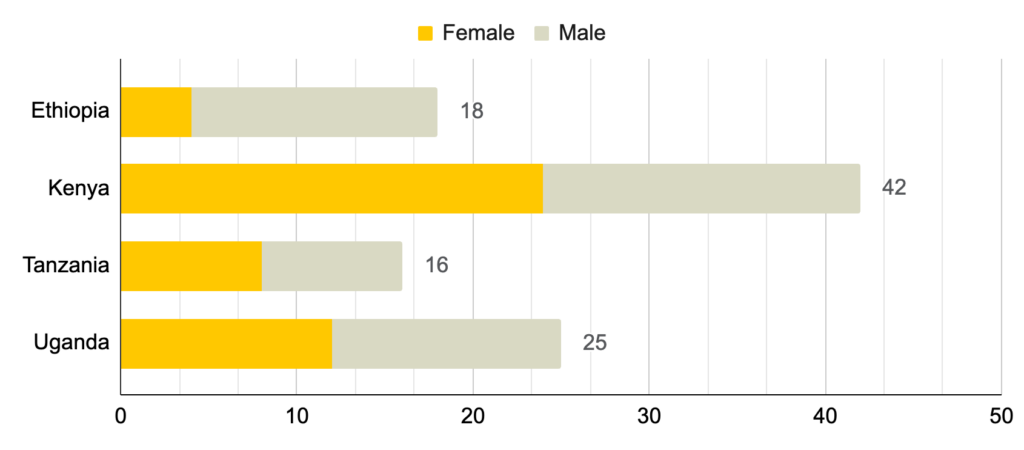
Solidaridad East and Central Africa received the inaugural RSB Transition Leaders’ Award in 2024, a testament to our unwavering commitment to pioneering sustainable solutions within the region’s agricultural sector. This prestigious award recognized our sustainability approaches, specifically, the successful integration of agroforestry into coffee farming systems to enhance biodiversity and farmer livelihoods. This recognition further underscored our strategic integration of biochar within our broader efforts to improve soil health and leverage carbon sequestration as a critical tool for climate resilience. Crucially, the award celebrated our farmer-led initiatives, emphasizing our belief in empowering local communities to drive sustainable change. This award underscored our role as a catalyst for transformative practices, demonstrating how collaborative and innovative approaches with rural communities lead to impactful and lasting sustainability outcomes.
Throughout the year, we strategically leveraged key events to amplify our message and drive sustainable change. We actively convened and participated in high-profile regional and global platforms, including the African Fine Coffees Association (AFCA), Investing in Africa Mining Indaba, and the UN Climate Change Conference (COP 29). At COP 29, we contributed to the dialogue on climate resilience by participating in a session at the NDC Partnership Pavilion titled Strengthening Agri-food Systems: Opportunities to Fast Track NDC Implementation Goals.’ This session highlighted locally-led approaches for scaling climate-smart practices, unlocking climate finance, and accelerating the implementation of national commitments (NDC’s), further demonstrating our commitment to driving impactful change. We actively contributed to the dialogue on promoting resilient food systems during the World Food Day NFP event. This engagement underscored our commitment to fostering sustainable and resilient food systems that benefit communities across the region.
Our strategic engagements in 2024 generated significant reach, connecting directly with 95,895 event attendees and extending our message to an estimated 1.72 million individuals through media and digital platforms, resulting in a total audience reach of approximately 1.8 million.
Leveraging key international days and digital platforms, we focused on engaging key stakeholders and driving meaningful dialogues and action, amplifying our impact through targeted campaigns and strategic media engagement. International Women’s Day campaigns across four countries reached over 2,400 stakeholders, celebrating women’s achievements and addressing gender challenges in agriculture and mining. International Coffee Day events engaged 10,000+ people, promoting sustainable coffee production. We also prioritized media outreach, securing coverage that reached 5 to 7 million people, solidifying Solidaridad’s position as a thought leader in sustainable development.”
Digital campaigns on LinkedIn saw a 3x increase in engagement and reached 112,000+ impressions, while X (Twitter) campaigns achieved a 150 percent increase in comments and 267,968 total impressions, demonstrating the power of digital platforms to expand our reach and engagement.
Through these diverse and targeted campaigns, Solidaridad successfully mobilized stakeholders and raised awareness about critical sustainability issues. Our efforts effectively drove action towards achieving our mission, demonstrating the power of strategic communication in fostering positive change.
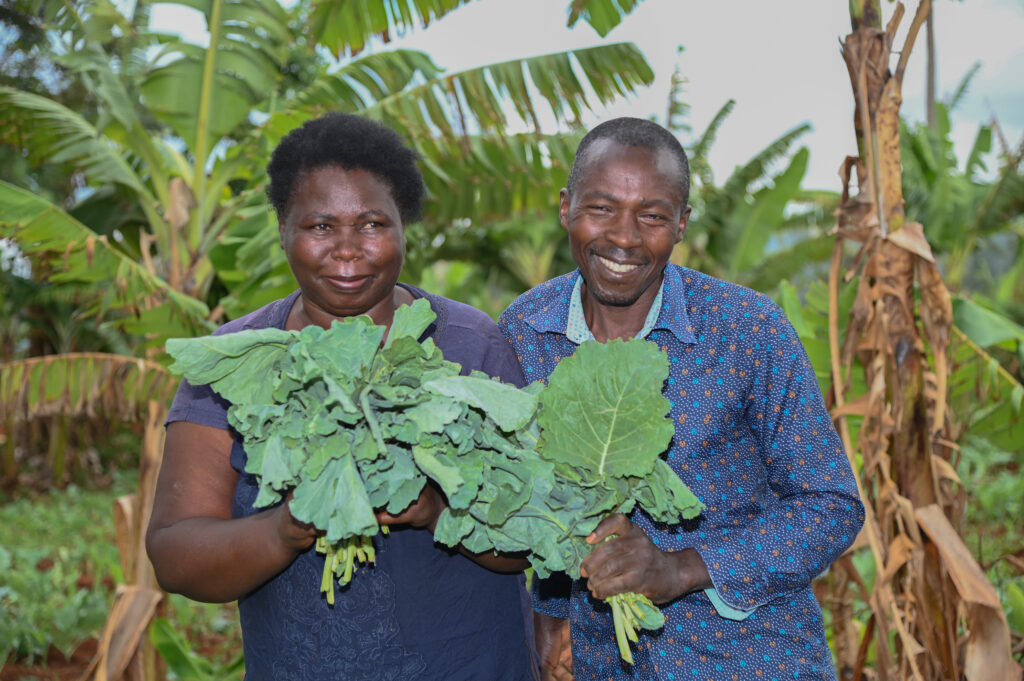
In 2024, Solidaridad East and Central Africa conducted comprehensive evaluations across East Africa, yielding crucial insights for programming. For instance, an endline evaluation of our leather interventions in Ethiopia revealed a significant shift in community perceptions towards tannery operations, with 58% reporting improved views. This change was attributed to effective waste reduction interventions, which resolved long-standing conflicts. Training on waste management and alternative tanning techniques further enhanced tannery practices and reduced environmental pollution.
Evaluations also underscored the importance of farm diversification for food and income security. Insights on household incomes from our horticulture project evaluation showed that on-farm diversification significantly boosted farmer resilience by enhancing income security, and countering income instability. 66.7% of the sample households relied on both crop and livestock farming, underscoring the critical role of diversification.
A final evaluation of our coffee and tea programmes in Tanzania highlighted increased coffee and tea exports, rising to 10,474 MT and 26,755 MT respectively, with farmers achieving high voluntary sustainability standards (VSS) compliance rates (99.31% for coffee, 98.88% for tea), surpassing compliance targets by 128.5%, demonstrating effectiveness and contributing to broader sustainability goals. Finally, the Motives and Incentives for Smallholder Coffee Farmers in Uganda to Participate in Acorn’s Agroforestry evaluation in Uganda indicated that over 90% of farmers recognized climate change as a major challenge. Notably, 86.6% saw tree planting as beneficial for revenue and farming, while over 90 percent linked it to climate change mitigation and adaptation. Carbon payment incentives were identified as a key motivator, potentially driving increased agroforestry adoption.
Finance
Solidaridad East & Central Africa’s income stood at EUR 9.6 million in 2024, a decrease from 2023 due to the conclusion of three European Union (EU)-funded projects in Tanzania and Ethiopia. The principal sources of income in 2024 were grants from the EU, the World Bank, and Danida. To ensure continued impact, we actively expanded our network of strategic partnerships, building upon the strong foundations laid by our vital donor relationships to drive sustainable growth in the years to come.
EUR 9.6 million was spent on project implementation and acquiring a regional head office. This represented decreased spending due to the conclusion of three EU projects, two in Tanzania and one in Ethiopia.
We deeply appreciate the continued support of our key partners, the EU, the World Bank, and Danida, whose grants formed the foundation of our 2024 activities.
